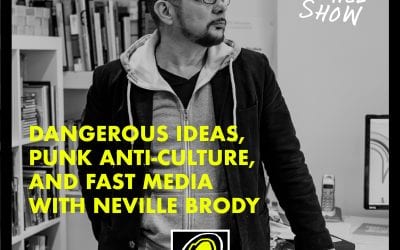LISTEN:
“As creators, what we do is we move through our emotions to present something to an audience. We can’t do that without burying a piece of ourselves. We can’t do that without digging into emotional content that can sometimes be triggering”
This episode:
In episode #5 of The Stuart Semple Show, host and artist Stuart Semple dives into the world of acting with Top Boy and For Life star Nicholas Pinnock.
Nothing is out of bounds in this intimate hour. Nicholas and Stuart talk about the subconscious and conscious brain on stage, emotional triggers that unlock creativity, and the hard road to recovery after a traumatic breakdown.
The Stuart Semple Show is an art podcast that encourages listeners to remain true to their art, no matter what. In this episode, Nicholas talks about only taking on roles that challenge and inspire him, even in dire straits.
This episode covers:
- The psychological side of getting into character
- Staying true to your art
- Putting a piece of yourself into your art
- Mental health and the road to recovery
- Accepting the negative with the positive
- Virtual art VS the real thing
Links & references:
Nicholas Pinnock Website:
http://www.nicholaspinnock.com/
Nicholas Pinnock Instagram:
https://www.instagram.com/nicholaspinnock/
Nicholas Pinnock Twitter:
https://twitter.com/nicholaspinnock
Stuart Semple Instagram:
https://www.instagram.com/stuartsemple/
Stuart Semple Facebook:
https://www.facebook.com/MrStuartSemple/
Stuart Semple Website:
Culture Hustle:
Episode highlights:
“I want to have a really deep conversation with you about emotion. I think that when it comes to art history, whether that’s acting, painting, or whatever art form, dance perhaps, there’s an emotional trigger that underlies that and helps us deliver our work. ” – Stuart Semple – 03:20
“As creators, what we do is we move through our emotions to present something to an audience. We can’t do that without burying a piece of ourselves. We can’t do that without digging into emotional content that can sometimes be triggering. ” – Nicholas Pinnock – 05:05
“What I can’t understand is how you get into that emotional state night after night after night to give the audience that experience. When I’m making a painting… when I’ve had a weird day and I want to paint about it, or I’ve had something sad happen, I can get it into a piece of work. It’s cathartic. I let it go. I don’t have to be back at 7:30pm at the same theatre every night.” – Stuart Semple – 8:20
“Your subconscious kicks into becoming that character. What happens is a huge takeover. For me, there’s between 90 and 95% of myself given over to the character. There’s 5 or 10% of me that knows that.” – Nicholas Pinnock – 10:28
“Have you actually learned how to put down emotions? Sometimes emotions bubble up in me and I don’t really know how to process them. I don’t have the vocabulary you do. I can spin out for two, three weeks on a negative sort of thing. I can’t put it down, it isn’t a character, it’s a situation in my life.” – Stuart Semple – 26:01
“I had a very traumatic breakdown 15 years ago. In the years after I had intense psychotherapy and learned how to use the tools from therapy in my daily life and put them into practice. For me, it was really helpful to embrace all the negative as much as the positive. You can’t have one without the other.” – Nicholas Pinnock – 26:40
“There’s been a lot in art about virtual art tools. I actually worked on a virtual art museum. It’s good, it’s a whole new platform. It’s lovely that people can access things who maybe couldn’t get to it before through location, finances, whatever. But there’s nothing like looking at the real thing.” – Stuart Semple – 38:18
“If you want to grow and become a prominent artist in any form, I truly believe that being true to yourself is vitally important. Following your instincts is another one because your instincts are generally right.” – Nicholas Pinnock – 47:10
“Even when things are really bad, you have to remain true to your art. Because in the long term, that’s the most rewarding thing to do.” – Stuart Semple – 48:14
MORE EPISODES:
Loneliness and Infrastructure, The British Pavilion, and Rethinking Social Spaces With Unscene Architecture Founder, Madeleine Kessler #8
The Stuart Semple Show delves into different industries to bring you the latest insights from leading creative minds. In episode 8, host Stuart Semple invites socially driven architect Maddie Kessler to talk about her recent British Pavilion project.
Loneliness and Infrastructure, The British Pavilion, and Rethinking Social Spaces With Unscene Architecture Founder, Madeleine Kessler #8
This episode is a true treat for the typographists. Famed designer Neville Brody joins host Stuart Semple to talk about The Face magazine, his Riot collaboration with Supreme, and his humble beginnings.
90s Culture, BAFTA nominations, and That Parliament Projection with Gail Porter #6
The Stuart Semple Show art podcast is back with another intimate hour of conversation. In this episode, Stuart speaks to ex-model and television personality Gail Porter.



